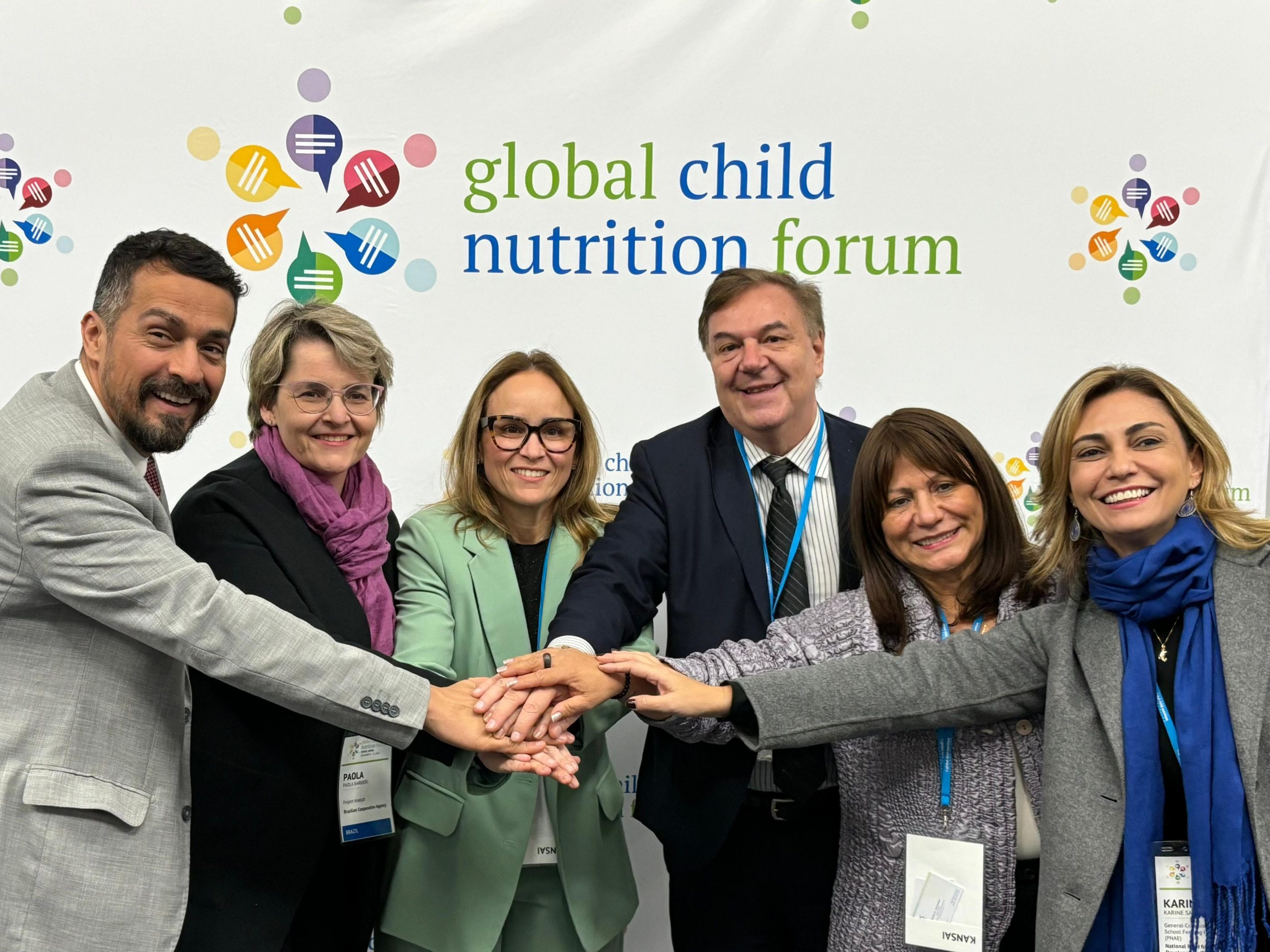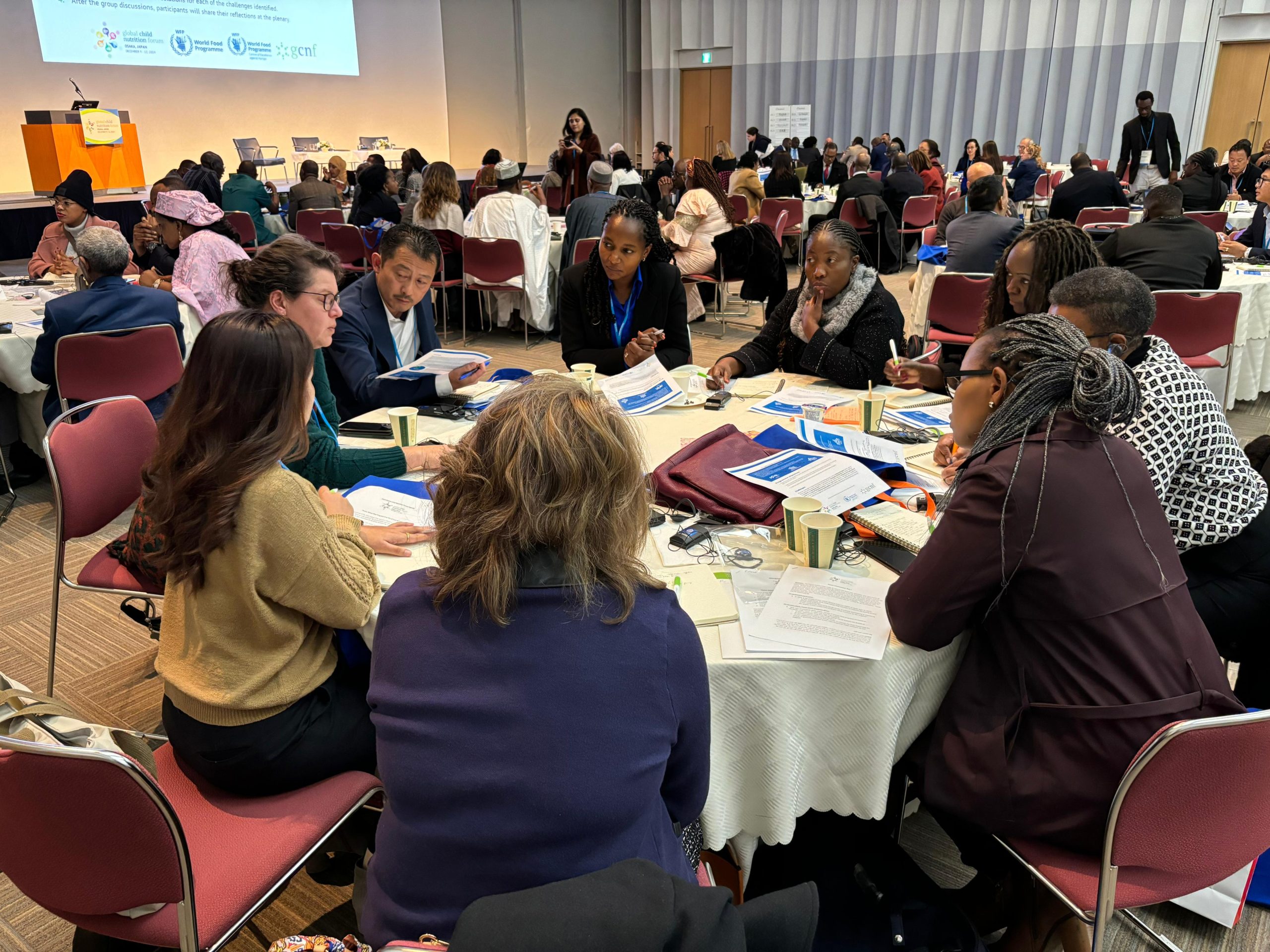
Brazil was present at the world’s largest event on child nutrition, which took place between December 9 and 12 in Osaka, Japan. The 24th Global Child Nutrition Forum (GCNF) was attended by teams from the World Food Program (WFP) Centre of Excellence against Hunger Brazil, the Brazilian Cooperation Agency (ABC, in Portuguese) and the National Fund for the Development of Education (FNDE, in Portuguese).
The Forum is a biennial conference that supports countries in developing and implementing sustainable school feeding programs. This year’s event brought together more than 400 participants from 84 countries, including government officials and multilateral institutions, NGOs and the private sector.
In 2024, the forum’s theme was “School Feeding Programs in the Age of Food Systems Transformation”, with one of the proposals for discussion being school feeding from the perspective of climate change. In plenary sessions and workshops, the countries exchanged their experiences and discussed climate-smart solutions, also taking into account gender bias and focusing on the nutritional quality of school meals.
Brazil
Brazil featured prominently throughout the Forum. In the session “School feeding on the global agenda”, the General Coordinator for Food Security and Nutrition at the Ministry of Foreign Affairs, Saulo Ceolin, presented the participants with the Global Alliance against Hunger and Poverty, a Brazilian initiative proposed during the country’s presidency of the G20, which was launched last month.
Ceolin explained how countries, international organizations, banks and other institutions can join the Alliance, which currently has more than 140 members. When detailing how the policy basket works, a set of approximately 50 tested and approved public policies built collectively by the members, Ceolin pointed out that the school feeding policy based on local purchases is one of the most important.
“Within this set of policies, school feeding is highlighted during all the Alliance’s negotiations and in its founding documents. Based on research into the international scenario for global development cooperation and funding, it is possible to state that the best way to invest money to achieve rapid results for hunger and poverty is in school feeding linked to local production.”
According to Ceolin, school feeding has always been one of the best-performing public policies. “In Brazil, we know that school feeding can really change scenarios and transform people’s realities and has an impact not only on the fight against hunger and poverty and the fight for nutritional improvement, but also on education, health and, when we include local purchases, economic, social and agricultural development,” he said.
Brazil also shared its experiences on the panel “Domestic Financing – What we are learning”, with the participation of Fernanda Pacobahyba, president of the FNDE. Pacobahyba spoke about how the National School Feeding Program (PNAE) is financed and praised the work of the nutritionists and caterers involved in the Program.
The president also commented on the importance of school feeding within the Global Alliance against Hunger and Poverty. “School feeding is part of the basket of successful social policies, and we believe that world hunger is still a political decision. School feeding is a great tool that can be used by all nations,” he said.
Workshop

A highlight of Brazil’s participation in the Forum was the workshop conducted by the Center of Excellence’s Programs team. Entitled “Integrating climate smart strategies for nutritious and sustainable food systems”, the workshop was attended by at least 100 participants.
In the first part, representatives from the Brazilian government, Cambodia and Kenya presented the school feeding programs in their respective countries. Each representative brought to the debate challenges faced in implementing school meals based on family farming and strategies adopted to overcome these issues.
Brazilian school feeding was presented by Karine dos Santos, General Coordinator of the National School Feeding Program (PNAE), who highlighted the challenges related to local purchases in traditional indigenous and quilombola communities.
The participants were then divided into groups covering different areas of knowledge (education, agriculture, health and others), in order to encourage the exchange of different perspectives and scenarios. Each group was given a hypothetical case and had to design solutions for the unique needs and contexts of each scenario, taking climate change as a starting point.
According to Vinicius Limongi, Program Officer at the Centre of Excellence, it was a very rich opportunity for exchange between the countries. “People from different sectors and parts of the world were able to bring a bit of their experience to propose solutions, in a kind of simulation that we did.”
Field trip
The final activity of the forum consisted of visiting a Japanese school to see in practice how Shokuiku, the Japanese Food and Nutrition Education model, is applied. It focuses on the participation of students in the entire school feeding process, taking into account the nutritional aspects of food, sustainability, tradition and children’s socialization.
In this model, children are encouraged to participate in harvesting the food, in the process of serving lunch to each other and in sharing and talking about their lunchboxes, so that they can try foods that are different from their own.
According to Ana Clara Cathalat, Program Assistant at the Centre of Excellence, Brazil can learn a lot from the model. “In Japan, the search for healthy eating habits is cultural, it starts in early childhood education. And this food and nutrition education reflects on the health of the Japanese throughout their lives.”
Bilateral meetings
The GCNF is also an important space for participants from all sectors to meet and share information, demands and establish new partnerships.
Throughout the event, the Centre of Excellence received numerous requests from countries and institutions to discuss new possibilities for working together and to analyze the progress of existing demands. This was the case with Malawi and the Republic of Congo, both of which are currently working with Brazil.
Several countries expressed interest in working with the Center of Excellence. In this regard, Director Daniel Balaban and the Programs team spoke with representatives from Laos, Tajikistan, the Democratic Republic of Congo and Côte d’Ivoire.
These countries are looking to expand their school feeding programmes and are interested in technical support, resource mobilization and partnerships. The Centre of Excellence team also met with representatives from Jordan, Kenya, Guinea Bissau and Food For Education, to name a few.
Closing Ceremony
A long-time supporter of the GCNF, Daniel Balaban was one of those responsible for closing the event, and took the opportunity to recap the history of the Centre of Excellence’s work with the GCNF, partners in organizing the Forum until 2019.
“It’s very interesting to follow the development of the countries. Today, all the participants have school feeding programs, which are also the result of lessons learned and experiences exchanged at the GCNF over the years. It’s gratifying to see people again and realize that the work done is already starting to show results,” he said.
Another highlight of his closing speech was the role Brazil has taken on in leading the global development agenda, spearheading initiatives such as the Global Alliance against Hunger and Poverty and the School Feeding Coalition.




